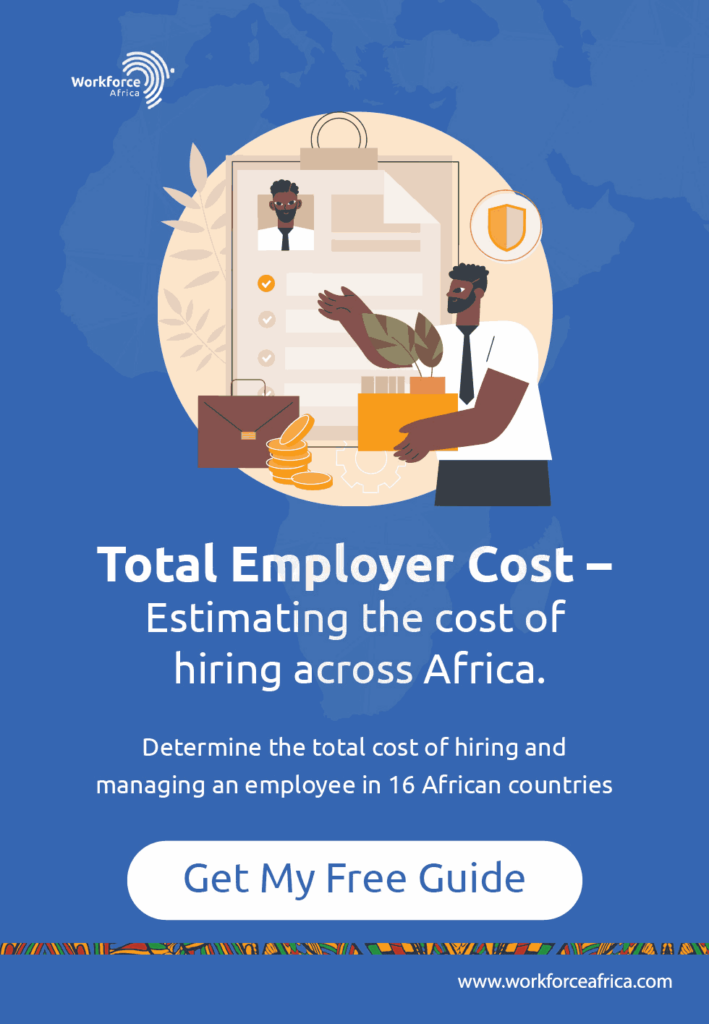
- hello@workforceafrica.com
- +234 816 305 6589
- +234 903 194 6744

The involvement of millennials in back-office support roles within the BPO industry is crucial to the growth and success of global businesses in this era, distinguished by the globalisation of business operations.
This article explores some concerns millennials have about their long-term career growth in these offshoring roles. It also analyses practical strategies businesses can adopt to address these concerns.
Over the past few decades, offshoring company services to foreign nations has increased. Although they offer businesses numerous advantages, such as reduced costs and easier access to talent, it also raises concern for millennials who take up some back-office offshoring roles like customer service, IT, HR, and finance, among other support roles. Engaging millennials in the workplace is crucial for companies that outsource their operations to offshore talent. They have to be aware of and responsive to talent concerns about these roles and the impact on their long-term career aspirations.
People born between the mid-1980s and the mid-1990s are known as millennials, according to a report of the British Council. They make up a resounding majority of the workforce, with estimates putting them at 75% by 2025
Millennials grew at a time of rapid technological advancement and multiple economic downturns. They are called "digital natives" since they are the first generation to have grown up with the internet.
Their early exposure to technology influenced their expectations in the workplace, communication style, and worldview.
In contrast to their past generations, Millennials' work ethics and personal traits are influenced by their life experiences and issues their families have faced.
Here are some of the characteristics of millennials in the workplace:
Millennials look for purpose in their jobs. They wish to be a part of something greater than themselves and have a sense of purpose.
Their attraction lies in several factors, including sustainability. Research by Korn Ferry indicates that approximately 54% of millennials are considering switching to more sustainability-focused employment. Because of this, businesses need to make sure that the goals and values of their company reflect those of millennials.
Millennials are accustomed to utilizing a wide range of digital tools and platforms since they grew up with technology at their fingertips.
They pick up on new technologies fast and value companies that use technology to improve productivity and streamline operations.
According to several surveys, millennials value work-life balance more than earlier generations did. They place a high value on workplace flexibility and individual well-being.
Companies with flexible work schedules, such as remote work choices, have a higher chance of drawing in and keeping millennials.
Millennials are very motivated to keep learning and growing. They expect organisations to offer continuing training and job progression for employees, and they value the chance to expand their knowledge and skill set.
Teamwork and collaboration are vital to millennials. Their upbringing has placed a strong emphasis on cooperation and shared experiences. They do best in a team-based setting where they may use a variety of skill sets to solve challenges and achieve common goals.
Offshoring back-office roles has become increasingly popular due to a combination of factors, including a skilled and cost-effective workforce, improved telecommunications infrastructure, and cultural affinity with Western clients. Some of the back-office roles are:
Call centres and customer service roles are commonly offshored to African countries, especially those with a proficient English-speaking workforce. The remote team will handle customer inquiries, technical support, and other service-related tasks.
Data entry and data processing tasks, such as data cleansing, data analysis, and data verification, can be efficiently handled by remote teams in African countries, ensuring accuracy and cost savings.
Administrative tasks like email management, appointment scheduling, and general office support are effectively outsourced.
moderation for websites, social media, and online platforms is a role well-sui Content ted for offshoring. African teams can help in monitoring and regulating user-generated content.
Market research, data collection, and competitive analysis can be outsourced to skilled researchers in African countries, providing cost-effective solutions for businesses.
Many African countries have a well-educated workforce with expertise in finance and accounting. Back-office functions such as accounts payable, accounts receivable, bookkeeping, and financial analysis are offshored to manage financial processes.
HR tasks like recruitment, payroll processing, and employee record management can be outsourced to African teams who handle these responsibilities efficiently.
African writers and content creators can provide content for websites, blogs, and marketing materials in English and other languages, offering cost-effective content solutions.
African countries are emerging as IT hubs, with a growing pool of skilled software developers and IT support professionals. Companies can offshore software development, quality assurance, and IT helpdesk services.
Online retailers can outsource various e-commerce support roles, including product listing, order processing, and customer inquiries.
Legal research, document review, and legal transcription services are taken up by millennials provided they have legal and English language proficiency.
Graphic design, video editing, and multimedia production services are outsourced to designers and multimedia specialists, offering creative solutions to businesses.
The apparent shift in the demographics of many businesses' operations in recent years has attracted millennials to make up a significant share of back-office support workers in different industries across the globe. With this development, many millennials need help finding longevity and fulfilment in these back-office outsourcing roles.
Employers in the BPO industry must comprehend and respond to the significant concerns of the millennial workforce if they want to keep this talent for a lengthy period.
Here’s how to engage millennials in the workplace to manage their concerns on some of these remote back-office positions:
Millennials desire visibility and recognition in the workplace but working remotely occasionally makes them less visible and less recognized. Millennials are frequently driven individuals who seek chances for professional development. They might be concerned that working as a back-office staff remotely would make it harder for them to advance or take on new duties.
To make sure these millennials are mindful of their career path and development prospects, BPO firms must conduct regular performance evaluations and goal-setting meetings and establish unambiguous career growth routes that include mentorship, training, and access to new tasks.
Millennials often place a high importance on professional advice and mentorship. Access to networking opportunities and mentors that usually take place in an actual office setting may be restricted when working remotely. This might be an obstacle to their long-term career development.
Organisations can establish virtual mentorship programs connecting remote employees with experienced professionals. Also, it can host virtual networking events to facilitate connections between remote workers and colleagues across different locations.
Millennials understand the importance of continuous learning and skill development. Being in a back-office remote role may limit their exposure to new challenges and opportunities for skill enhancement, potentially stunting their long-term career prospects.
BPO firms can provide access to online courses and resources to support millennials' skill development. They can assign remote employees to challenging projects to foster skill growth and personal development.
Remote workers may earn different salaries based on location, but the increase in pay and other benefits the onshore team has may not be opened to offshore team. This can affect millennials working as a remote staff morale because their financial well-being and long-term financial planning are critical. They often have aspirations of financial security and building wealth for good living.
Employers ensuring transparency in compensation and benefits for remote employees shows how to engage millennials in the workplace. This addresses the disparities based on location and offers merit-based wage increases to millennials working remotely based on performance.
It might be difficult for millennials to balance work and play, as they frequently prefer work-life integration to rigid work-life schedules. While remote jobs can be flexible, they can also make it harder for employees to draw boundaries between their personal and professional lives, lowering their quality of life over time.
Health problems may arise from working long hours at a remote job. Since millennials are becoming more aware of their health, they can be worried about how their present employment arrangement will affect their long-term mental and physical well-being.
Offshore firms can support millennials in creating boundaries between their personal and professional lives, giving them access to mental health resources, encouraging work-life balance, and putting wellness initiatives into place.
Millennials are known for looking for meaningful jobs that complement their objectives and ideals. Working remotely occasionally makes it more challenging to have a sense of purpose, which is crucial for having a life that is fulfilling and enjoyable throughout one's career.
Global firms should ensure their remote workers see how their contributions fit into the mission and value of the organisation and how significant they are to the company's growth.
Millennials may need help with their ability to save for urgent needs, given potential income disparities and job security concerns. They might also be concerned about achieving financial independence for a fulfilling life.
To help millennials guarantee their financial future, BPO companies can provide financial planning tools. They can also encourage financial literacy to empower this generation to make wise financial decisions in their back-office roles.
Even though some people thrive on BPO roles that involve monotonous, repeated activities, millennials often find this model tedious and uninteresting. Over time, these routine administrative tasks become discouraging due to millennials' inclination towards having experience on various tasks while on the job.
Back- office roles frequently favour precision and accuracy over creativity. On the other hand, millennials do best when allowed the freedom to solve problems, be creative, and think strategically. Today's back-office roles often have highly controlled, metrics-based structures, which results in low levels of engagement.
Integrating certain back-office functions around higher-level project work can help businesses increase satisfaction among millennials. Data analysis, process optimization, customer experience enhancement, and other areas are a few examples. Leaders in BPO should look at processes to find ways to foster roles that use millennials' skills outside of menial work.
Strategies for job rotation may help increase diversity for millennials. Being involved in unique initiatives or exploring tasks in other areas can help reduce boredom. More flexibility and trust are required from management to boost millennials' morale and retention.
Managing millennials' concerns is crucial for BPO companies wanting to retain talent in the long run. By implementing strategies around career growth, skill development, work-life balance, purpose, and financial planning, firms can increase engagement and satisfaction levels for these freelancers in back-office roles.
Though some functions involve repetitive tasks, companies should look for ways to incorporate analytical thinking and process improvements. With proper support, millennials can find meaning and longevity in this gig economy.
Are you interested in developing engaged, high-performing teams across Africa? Schedule a consultation today.